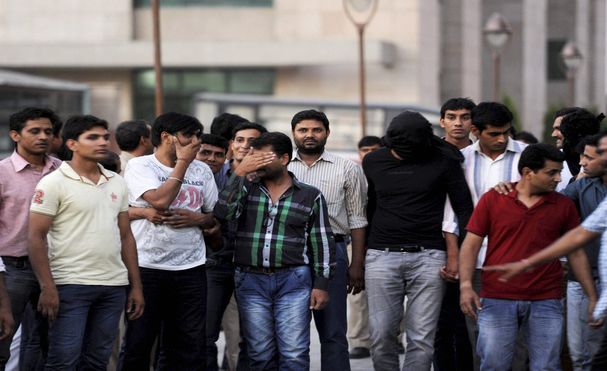Five years ago, during the first season, I was convinced that the Indian Premier League (IPL) was caught in a vice-like grip of organised betting syndicate(s). At pubs in Delhi, I found different groups of dozen or more youngsters (21-30 years) who, during a game, would call a number from their mobiles, find out the odds, and place bets. Even then, I realized that the manner in which the betting mafia operated had changed. The syndicate(s) no longer gave odds only on the overall results of the match.
Instead, the organisers of the betting consortium focused on events, balls, and individual cricketers. Most betters, whom I watched closely, put their money on how many runs (under 10 or between 10 and 15) would be scored in a particular over, would a team score less than 75 or between 76 and 100 in the first ten overs, and would a particular batsman score less than 20 runs or more. The low bets were on how many wides or no-balls would be bowled in a specific over.
Also read: IPL fixing: Why blaming BCCI isn't a solution
When I investigated a bit more, I found that the young betters coordinated with local bookies (in a particular locality, say, Karol Bagh, or a larger area, like South Delhi), who gave them regular odds on various short-term future scenarios. In fact, most of the betters were regular clients of a specific bookie in their area, and they had got in touch with the latter through friends or acquaintances. “You have to be personally introduced to the bookies,” one of the betters told me.
The local bookies were selected through a secret and mysterious process, and had no clue about who was the mastermind(s) behind the illegal operation. They were not even aware whether it was controlled by one or several syndicates, and whether they were based in India or abroad. The ‘retail’ bookies, the small fish as they are called, were given a mobile, which they called the ‘dabba’ (box) and half-an-hour before an IPL game, they were asked to call a number (‘line’).
As soon the bookies called the ‘line’, they put the mobiles on loudspeaker and in streamed in the odds for various future outcomes. It would start with which team would win the toss, and whether it would elect to bat or field. As mentioned earlier, the bets would move to runs scored in an over, in the first ten overs, and total score after 20 overs. The bookies would relay these odds regularly to their own group of betters, who could be watching the game at home, in office, or at a pub.
I was told that each better, who became the client of a local bookie, had to pay an advance amount. The sum depended on past experience of how much he/she bet during a game or what was his/her capacity to lose or win. The newcomers were asked to deposit any amount, which could not be below the specified minimum. Based on how the betters performed during a match – whether they won or lost – they could be asked not to place any more bets if their losses were too high.
Having known this by the beginning of the second IPL season (2009), I found out that the betting amounts during each IPL season ran into thousands of millions of rupees. It was, therefore, logical to assume that the betting mafia had either got, or would definitely try to get, to the players, team owners, coached, and administrators for each of the city franchises. Obviously, the betting syndicate(s) would wish to improve its odds of winning by ‘fixing’ short-term outcomes.
One wasn’t shocked when an India TV sting found that young cricketers were involved in ‘spot’ fixing, or telling the bookies beforehand that they would bowl a no-ball or a wide on a particular ball in an over. The recent arrest of three players of Rajasthan Royals, including Sreesanth, who has represented India, seemed a natural progression of organized betting in IPL. I am sure that more names of either cricketers or those associated with the IPL franchises will soon tumble out of the cupboards.
The fact is that IPL, or T-20 matches are tailor-made for fixing and betting for several reasons. One, most viewers expect the ‘unexpected’ in 20-over games. It is not unusual if a bowler gives away too many runs, or a batsman underperforms miserably. Those are indeed the magical and exciting uncertainties of the game, which get accentuated in a shorter format. Thus, it was easy for the bookies to fix many outcomes during a match in association with the players and others.
In addition, IPL had attracted a range of young and other cricketers, who knew that they would never represent their country. In a sense, they were above-average players, who were unlikely to reach the top. For them, who played for club and state teams, IPL was the only avenue to earn huge incomes. Since they thought it impossible for them to get sponsorship money, it would be easy to woo them with a few million of rupees for every bet they would participate in.
Three, IPL was modeled as an entertainment event, with cricket thrown in. Thus, the possibility of the bookies to interact with the players – at the stadia, in dugouts, and even during post-match parties – was high. This had been curbed during regular international matched by the ICC after the match-fixing scandal that broke out in the late 1990s and engulfed several renowned cricketers. More important, IPL emerged as more of a business league than a sporting one.
One would have assumed that the BCCI would take cognizance of this, especially after the India TV sting. Instead, the BCCI spent more time and effort to convince viewers that the league was still honest and betting was a minor, one-time irritant. The same has happened now. N. Srinivasan, the Board Chairman in his video conference after the arrest of three players, sought to uphold IPL’s integrity. He said that the incident did not imply that IPL was ‘untenable’ or corrupt.
Srinivasan’s ‘zero tolerance’ for ‘fixing’ was that whoever is found guilty would be punished; players involved would be banned for life. However, one would have thought that the BCCI, along with ICC, would conduct a thorough internal inquiry into all teams and players to find out the extent of bookies influence. It is time to clean the system, systematically and thoroughly, instead of waiting for more skeletons to tumble out and then only take action against those ‘dead’ individuals.
It is time for the sake of Indian cricket for the BCCI to be pro-active, rather than be lazily reactive and continue to sing praises of IPL.
(Alam Srinivas has written a book, IPL: Cricket and Commerce, and an updated version, IPL: Cricket and Corruption)

